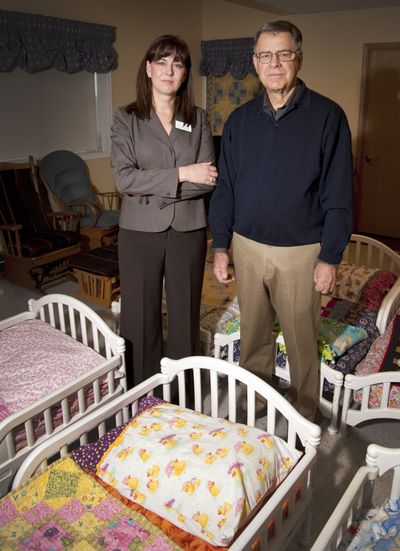Vanessa Behan haven for kids at risk

It’s been 30 years, but Bill Bialkowsky’s eyes still fill as he recalled reading the coroner’s report. “Fractured skull. Cigarette burns. Pulled hair,” he cleared his throat. “She died a very agonizing, slow, painful death at the hands of her parents.”
“She” was 2-year-old Vanessa Behan, and her death prompted Bialkowsky to found a safe haven for children at risk.
On Jan. 9, the Vanessa Behan Crisis Nursery celebrated its 25th anniversary. Since 1982, more than 67,500 children have found refuge here.
From a conference room at the nursery, Bialkowsky and executive director Amy Knapton recalled its genesis.
Like many Spokane residents, Bialkowsky learned of Vanessa’s death in the newspaper, and closely followed the subsequent trial and acquittal of her stepfather, Joseph Kennedy. Though the autopsy revealed the toddler died from a severe blow to the stomach that ruptured her intestine, prosecutors were unable to convince a jury that it was Kennedy who delivered the fatal blow.
“It brings tears to my eyes even now to think about the hell she went through,” Bialkowsky said. “I had a 4-year-old and a 2-year-old at home at the time.”
He was so distraught that his wife urged him to channel his emotion and do something productive. Bialkowsky had a career in sales and no experience in social work or child abuse prevention. But as he researched what could be done to prevent abuse, he discovered other states had crisis nurseries, where parents under stress could leave their children until they felt better able to cope.
In October 1982, he met with five other men, including George Nethercutt, and formed the founding board of the Vanessa Behan Crisis Nursery.
With the help of the Comstock Foundation, the board purchased a house on East Eighth Avenue. Volunteers gutted and renovated the home using donated materials. On the fifth anniversary of Vanessa’s death, the Vanessa Behan Crisis Nursery opened its doors.
“We served 427 children that first year,” Knapton said. “Now, we’re getting close to serving that many in a month.”
Staffed by trained house parents and numerous volunteers, the nursery provides care for children from birth to age 6. It’s licensed to care for up to 23 kids and is open 24 hours a day, 365 days a year. “The only time we’ve ever closed our doors was during ice storm,” in 1996, Bialkowsky said.
While at the nursery, children receive food, clothing, diapers and anything else they might need, including nurturing care from volunteers. Children can stay at the nursery for up to 72 hours; the average stay is 24 hours.
Within 13 years, the nursery had outgrown its space. “We were turning away as many people as we served,” Knapton said.
When the two houses next door became available for purchase, the board quickly secured them and the expansion began. Throughout the process, the nursery stayed open and continued to serve families in need.
In 2000, the Vanessa Behan Crisis Nursery unveiled its larger facility. Last year 3,891 children were served, but the need continues to grow.
“We are turning away 2,000 kids annually,” Knapton said. “We’re looking at continued growth in services and space.”
One new service is the H.O.P.E (Holistic Opportunities Providing Empowerment) program. The program stemmed from a conversation Knapton had with her staff about what happens when a parent calls them and is turned away for lack of space.
“We started calling families back within 24 hours to find out how they were and what was going on,” she said. What began as a way to track families that are turned away became a vehicle to help a wider base, and resulted in a 50 percent increase in families served.
In addition to providing children a safe place to stay, the nursery offers parenting classes, crisis counseling and basic baby essentials for families in need. Last year, $75,000 worth of diapers, wipes and formula were given away – and that doesn’t count what was used on site.
Bialkowsky and Knapton stress that none of this would be possible without the sustained and generous support of the community. “We don’t solicit or accept state or federal funding,” Bialkowsky said.
As he walked through the nursery last week, he stopped to high-five a toddler running through the brightly-colored playroom.
“Reading time!” yelled the boy, as he grabbed a picture book and headed to a rocking chair, where a volunteer waited.
Once again, Bialkowsky’s eyes filled with tears. “This is the 25-year living legacy of a little girl who never had a chance.”